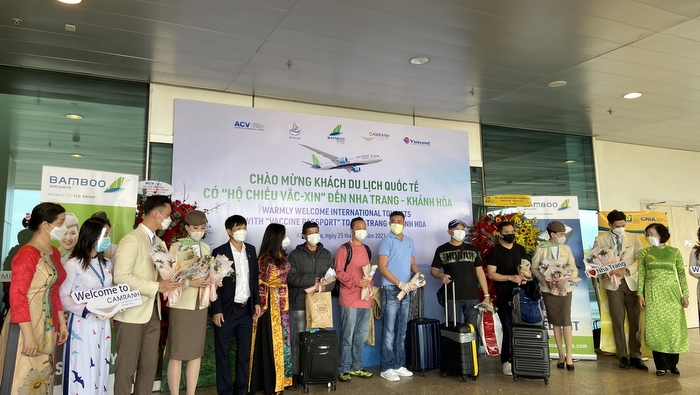The central coastal province of Khanh Hoa, home to famous beach towns Nha Trang and Cam Ranh, on November 25 welcomed the first international tourists with vaccine passports after a long hiatus due to the COVID-19 pandemic.

The first international tourists with vaccine passports are welcomed in Khanh Hoa province. (Photo: Tien Phat)
The visitors who are Americans and Canadians of Vietnamese origin took a flight of Bamboo Airways from Seoul, the Republic of Korea (RoK).
After their arrival, the tourists were transported to a lodging facility in Nha Trang and tested for the coronavirus.
Khanh Hoa is one of the five localities, together with Kien Giang, Quang Ninh, Quang Nam, and Da Nang, selected to roll out the pilot “vaccine passport” programme.
The programme is divided into three phases, starting from this November.
In the first phase that starts this month, designated places and tourism facilities in Phu Quoc, Khanh Hoa, Quang Nam, Da Nang, Quang Ninh can receive foreign tourists within package tourism programmes arriving via either charter flights or international commercial flights.
In the second phase that takes effect from January 2022, the scale of the pilot plan will be expanded by connecting destinations through regular charter and international commercial flights.
The tourists could participate in travel programmes that combine multiple destinations after completing their tours at the first destination within seven days. Five destinations – Kien Giang, Nha Trang, Da Nang, Quang Nam and Quang Ninh – will be piloted first and some other localities will be added to the programmes later as long as the pandemic conditions permit and the local authorities submit proposals to welcome international tourists.
Vietnam’s tourism market will fully open to international tourists in the last phase, the starting time of which will be based on the contemporary pandemic situation on the evaluation of the two previous phases.
The plan will apply to foreign tourists and overseas Vietnamese arriving from Vietnam’s key and potential tourism markets. They must prove certificates of taking full doses of the COVID-19 vaccination or COVID-19 recovery that are recognised by the authorities in Vietnam, except children under 12 years old accompanied by parents or guardians. For COVID-19 recovery patients, the time from being discharged from the hospital to the time of departure must not exceed six months.
Other conditions include having negative results for SARS-CoV-2 test by RT-PCR/RT-LAMP method within 72 hours before departure and certified by the authority of the country conducting the test (from time of sampling) and having medical or travel insurance that covers COVID-19 treatment with a minimum liability of 50,000 USD.
Tourists within the pilot tours must have their temperature regularly checked and use the IGOVN application during their stay. Masking is required, and there will be no quarantine mandate.
On the first day of entry, tourists will be taken to the accommodation facility and have COVID tests. They could continue their stay if the tests prove negative; otherwise, they will be taken to a medical facility and the cost will be covered by insurance or travel agency.
Within the first seven days, tourists must adhere to the schedule, ensuring pandemic prevention regulations and taking self-tests every two to three days. In case of having any symptoms of fever, cough, shortness of breath or sore throat, they must notify medical staff for screening tests.
After seven days, those who continue to stay in Vietnam must test themselves for COVID-19 and could travel to other localities within the programme if the results are negative. Those who want to see their relatives in Vietnam need to register with their tour operators.
Vietnam stopped receiving international visitors since the outbreak of the pandemic in March 2020 and only allowed foreign experts’ entry.